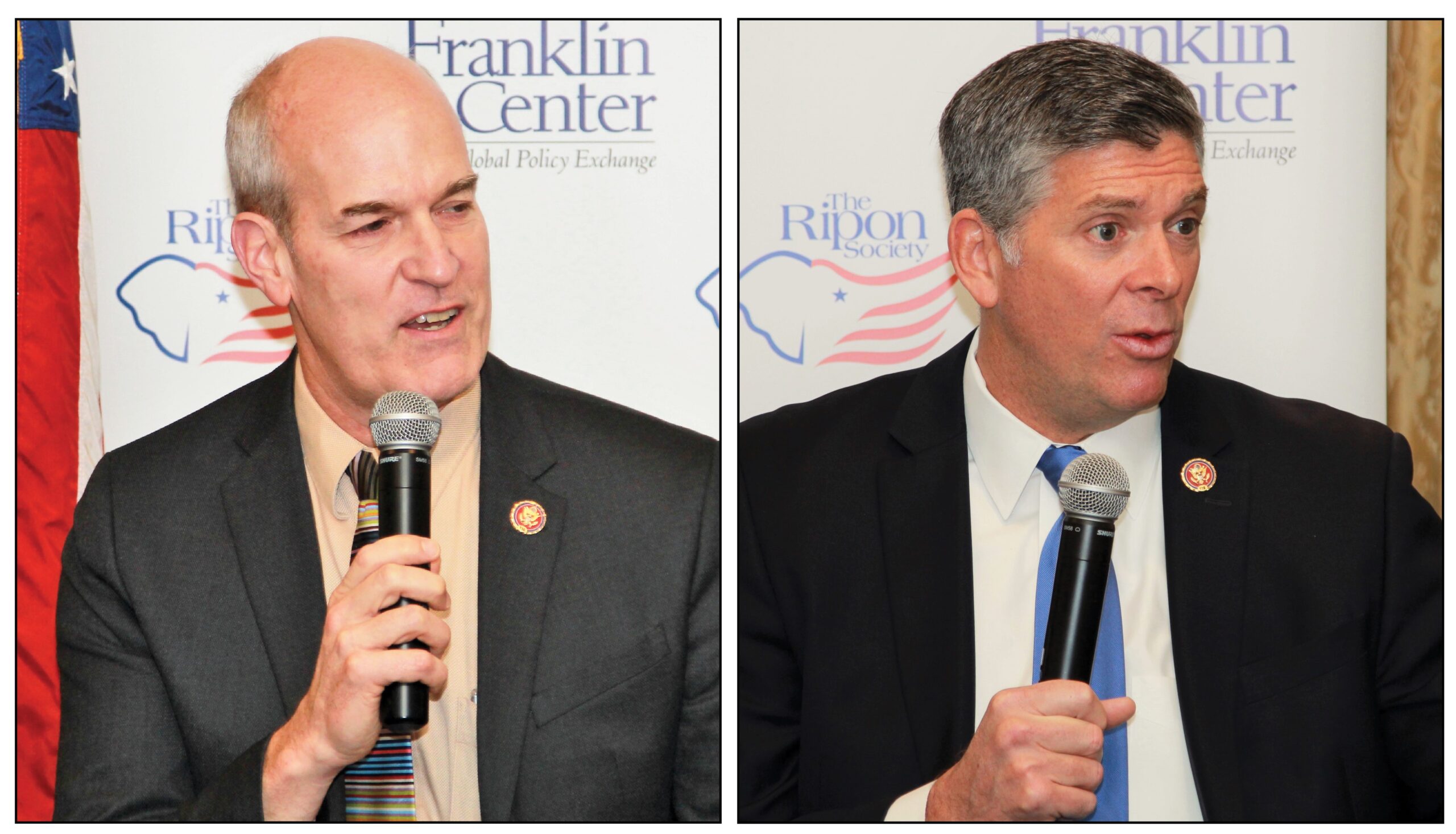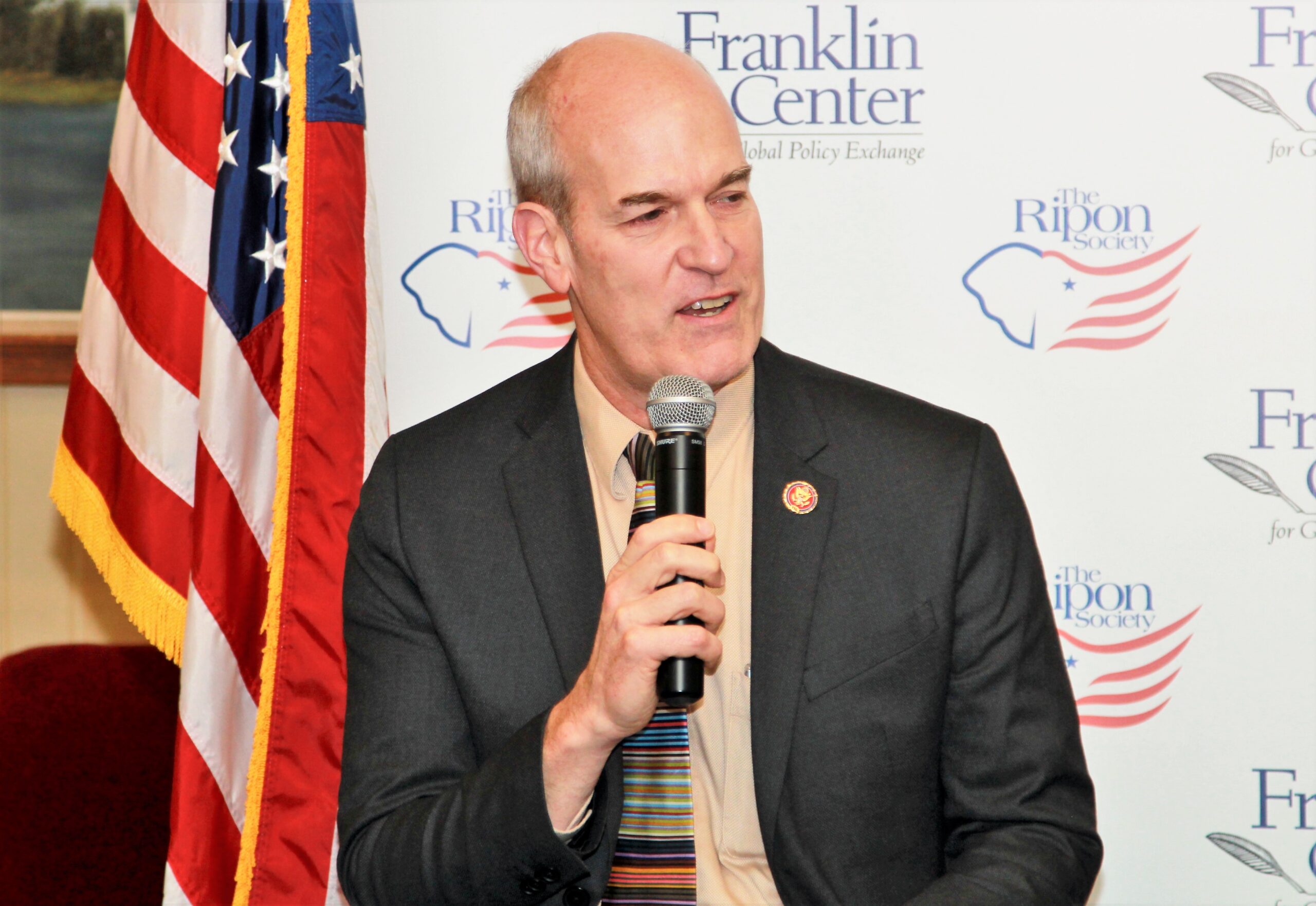 Larsen & LaHood Discuss U.S. – China Relationship with Crucial Trade Negotiations Underway
Larsen & LaHood Discuss U.S. – China Relationship with Crucial Trade Negotiations Underway
WASHINGTON, DC – The bipartisan Co-Chairs of the U.S.-China Working Group appeared yesterday before a breakfast meeting of The Ripon Society and Franklin Center for Global Policy Exchange, where they not only discussed the Congressional delegation they recently led to China, but the future of the U.S.-China trade relationship with crucial negotiations underway.
The Co-Chairs were Republican Congressman Darin LaHood, who represents the 18th District of Illinois, and Democratic Congressman Rick Larsen, who represents the 2nd District of Washington. LaHood kicked off the discussion by touching on the agenda of the CODEL, and outlining some of the key briefings the delegation had with both American and Chinese officials along the way.
“This was my second trip,” LaHood said of the mission, which took place earlier this month. “We were in Hong Kong for the first day and a half, and then Hangzhou and then Beijing. We really had some high level, substantive meetings while we were there. I think we were the first delegation from Congress to be there in about the last eight months. Obviously, the pinnacle point of the trip was trade. That was our main focus.
“Rick and I brought four other members of Congress — all from different states and different backgrounds — so it was a diverse group of Republicans and Democrats that went. We met with Ambassador Lighthizer before we left to get a sense from the Administration on where they’re at with their current trade negotiations. Just yesterday, we debriefed the Ambassador and his staff as they were on their way to China with Secretary Mnuchin.”

LaHood was elected to the House in 2015 and was named Co-Chair of the USCWG in 2016. He is also a member of the Ways & Means Committee. In these and other roles, he has pushed not only to reduce the number of regulatory shackles placed on American businesses here at home, but level the playing field for American companies and workers trying to compete overseas.
He touched on these efforts in his remarks, and how the recent CODEL focused on the need to hold China to the same set of standards that other countries operate under around the world.
“We talked a lot about the enforcement mechanism that we haven’t been able to have in our relationship with China in terms of trade,” the Illinois lawmaker said, adding that the group also focused on “how we get China to abide by the same rules that every other industrialized country in the world abides by.”
“I’m not a fan of tariffs — tariffs are taxes in my view. You look at the effect that they’ve had on agriculture products and manufacturing. So we talked a lot about the retaliation that China has engaged in with regard to tariffs. And moving forward, what type of enforcement mechanism do we put in place with the Chinese to make sure that they abide by the rules?”
Larsen echoed LaHood’s remarks, and kicked off his own comments by describing the mood in Congress when it comes to China, and the message the USCWG members were trying to send during their visit to the country earlier this month.
“There are national security hawks on China, there are trade hawks on China, and there are human rights hawks on China,” Larsen said, describing the political landscape on Capitol Hill. “In the last couple of years, those three hawk groups have found each other and have created a different consensus in Congress on where that center of gravity rests with regard to the relationship. That was one of the messages that we gave to the Chinese leadership with regard to trade.”
“There is bipartisan consensus on the need for China to make some changes in its economic policies. I think it’s fair to say that some of us differ with the Administration on their approach, but I left that at home — I didn’t take that with me. I don’t think it’s appropriate to have that debate in front of the Chinese in China. So we tried to stay focused on that bipartisan message of concern. That’s why Democrats and Republicans were there together.”

Larsen was elected to Congress in 2000 and co-founded the U.S.-China Working Group in 2005. In this role, he has visited China nine times, and has led the effort on Capitol Hill to educate Members of Congress about U.S.-China issues – issues, he said, which are not just critical to the future of the American people, but critical to the people he represents in Washington.
“In my state,” he noted, “40% of the jobs are directly dependent on trade. 60% of the jobs are directly dependent on trade in my county. Two separate studies – from Brookings and from Peterson — say that my county gets hit the hardest if there’s an all-out trade war. So it is not in the interest my district for this thing to get really out of hand.”
Following their opening remarks, LaHood and Larsen took a number of questions, including one about the goal of U.S.-China trade negotiations, and the possibility that Lighthizer and Mnuchin might reach an agreement during their trip.
“We want substantive, structural change when it comes to how the Chinese deal with us,” LaHood declared. “That’s really the crux of what they’re getting at. A purchase agreement will be a part of that. They’re going to buy more soybeans and corn and ethanol and DDGS and airplanes and all that. But you know, particularly on the technology side, you look at the forced technology transfers, you look at the data localization issue, you look at theft of IP, cybersecurity — those are really issues regarding how you put an enforcement mechanism in place that works.”
“I think these next two weeks we’ll know where we’re headed. But I think the Administration is prepared to continue on with tariffs. I don’t necessarily think that’s good for our economy long term. It’s not good for my farmers. The ag economy is down about 13% over the last year. There’s a lot of anxiety. There’s a lot of stress out there because of the tariffs. So we’ll have to see. But I think there’s a narrow path to get this done.”
The Illinois Republican and Washington State Democrat were also asked the state of China’s economy and their impressions in that regard while they were there.
“My impression of the state of the Chinese economy is that it’s not as robust as they’re predicting,” Larsen stated bluntly. “They’re predicting a band of growth – six to six and a half percent. It’ll probably be less than that. It probably is less than that now. And the biggest driver of that aren’t the tariffs. It’s local debt — provincial debt. The central government doesn’t have a lot of control — direct control — over provincial debt.
“The provinces have a desperate desire to create jobs, because that’s what moves you ahead in the system there. But it moves you ahead in the communist party system, and so they’re not as likely to follow national or central government dicta when it comes to debt. And that hangover on the provincial debt is a big problem for them. Now add on to that the tariffs, it becomes more of a problem. But the big driver on the underlying problem in their economy is the mass of provincial debt.”
To view the remarks of Larsen and LaHood before the breakfast discussion yesterday morning, please click on the link below:
The Ripon Society is a public policy organization that was founded in 1962 and takes its name from the town where the Republican Party was born in 1854 – Ripon, Wisconsin. One of the main goals of The Ripon Society is to promote the ideas and principles that have made America great and contributed to the GOP’s success. These ideas include keeping our nation secure, keeping taxes low and having a federal government that is smaller, smarter and more accountable to the people.
Founded in 1978, The Franklin Center for Global Policy Exchange is a non-partisan, non-profit 501(c)(3) organization committed to enhancing global understanding of important international issues. The Franklin Center brings together Members of the U.S. Congress and their international parliamentary counterparts as well as experts from the Diplomatic corps, foreign officials, senior private sector representatives, scholars, and other public policy experts. Through regular conferences and events where leading international opinion leaders share ideas, the Franklin Center promotes enlightened, balanced, and unbiased international policy discussion on major international issues.



